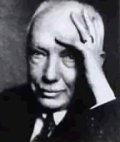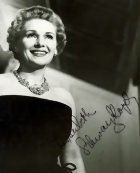
Richard Strauss
Richard Strauss had seen a lot in his 85 years. When he was born, Brahms was still the undisputed king of German music, and by the time he died, the world was a place of aeroplanes and atom bombs.
Music had, in those 85 years, gone through its most rapid evolution ever. From early Romantic, the Wagnerian excesses, and finally the angular modernism of Stravinsky, Bartok and Prokofiev.
Strauss lived through those times, and his music reflected the changes around him. His early compositions were heavily influenced by Wagner, and Strauss inherited Wagner's like of large orchestras and their rich and complex tone color.
But bit by bit Strauss found his own voice. He refused to follow the footsteps of the modernists, and in fact rejected what he saw as the twentieth century's decay into disorder. The music of Richard Strauss is the natural progression of the Romantic movement, expressive, emotional, complex.
And so to the
Four Last Songs (
Vier letze Lieder), finished in September 1948, near the end of Strauss' life, a work that his publisher described as “a farewell of serene confidence”.
The first three songs are set to texts by Hermann Hesse;
Früling (
Spring),
September,
Beim Schlafengehen (
Going to Sleep). The last song,
Im Abendrot (
At Dusk) is to a poem by Joseph von Eichendorf. Whether Strauss intended them to be performed as a set is arguable, but the common theme of peacefully nearing the end of one's life naturally groups them together. There are in fact sketches for a fifth song,
Nacht by Hesse again, but Strauss died before its completion.

Elisabeth Schwarzkopf
Gramophone magazine wrote of Elisabeth Schwarzkopf's 1965 recording “a heavenly record, so beautiful that it goes against the grain to analyse it”. And it is heavenly still, never being out of print since its first release.
Schwarzkopf is well-known for sculpting each phrase so that it perfectly suits the words, to the point of working on one line for hours to get it just right. She makes it sound, as it should, effortless, soaring, and sincere.
It is no exaggeration to say that Strauss perfected the orchestral song with the
Four Last Songs; melodically and harmonically complex, rich in tonal colors, floating and serene. And achingly beautiful. The voice no longer simply carries the melody, but forms an integral part of the whole aural vista.
This is the second recording of the
Four Last Songs by Elisabeth Schwarzkopf, the first from 1953 with Otto Ackermann. Critics hold both in high regard, the first fresh and light, and this recording more mature and crafted. Schwarzkopf herself prefered this later recording.
As well as the
Four Last Songs, the CD also includes twleve other orchestral songs, spanning the entire carreer of Strauss. While all are memorable, highlights include the beautiful
Morgen (
Tomorrow) and the exquisite little cradle song
Wiegenlied.
If you thought beauty and music went separate paths in the late nineteenth century, then listen to this recording of the
Four Last Songs by Richard Strauss, the last Romantic.
Please support Good-Music-Guide.com
by purchasing this CD using this link.

Track Listing
Richard Strauss
Four Last Songs
(Vier letze Lieder)
Elisabeth Schwarzkopf
Berlin Radio Symphony Orchestra
George Szell
Four Last Songs
- Frühling (Spring)
- September
- Beim Schlafengehem (Going to Sleep)
- Im Abendrot (At Dusk)
Orchestral Songs
- Mutterandelei, Op. 43, No. 2
- Waldseligkeit, Op. 49, No. 1
- Zueignung, Op. 10, No. 1
- Freundliche Vision, Op. 48, No. 1
- Die Heiligen Drei Konige, Op. 56, No. 6
- Rube, Meine Seele, Op. 27, No. 1
- Meinem Kinde, Op. 37, No. 3
- Wiegenlied, Op. 41, No. 1
- Morgen, Op. 27, No. 4
- Das Bachlein, Op. 88, No. 1
- Die Rosenbande, Op. 36, No. 1
- Winterweihe, Op. 48, No. 4